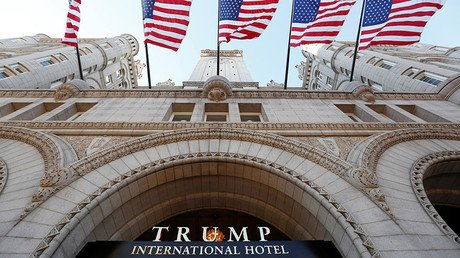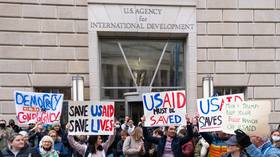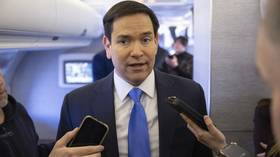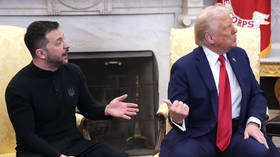Trump slapped with second lawsuit for accepting foreign payments through businesses
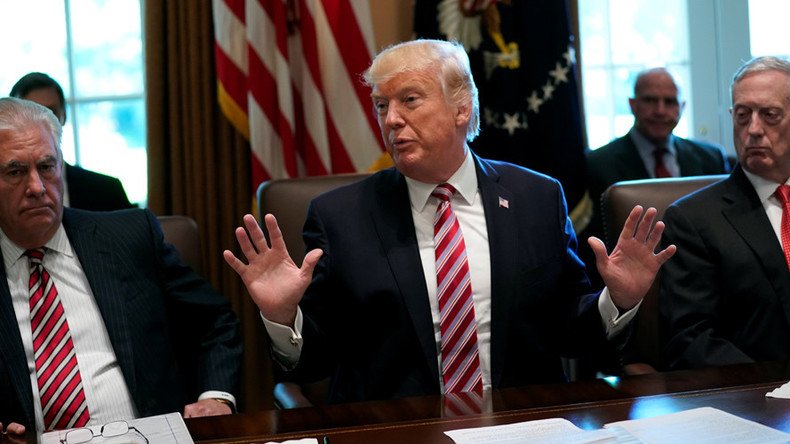
Two attorneys general have filed a lawsuit against the US president for "flagrantly" violating anti-corruption laws, claiming foreign payments made to Donald Trump’s businesses are in violation of the Emoluments Clause of the US Constitution.
The suit by the Maryland and District of Columbia attorneys general was filed on Monday morning. It accuses Trump of violating the Emoluments Clause, which bars the president from accepting gifts from foreign governments without approval from Congress.
"We do not sue the president of the United States casually. I wish President Trump had addressed these issues, these violations himself, but he has not, and they must be addressed and remedied," Maryland Attorney General Brian Frosh told reporters.
#Trump slapped with second lawsuit for accepting foreign payments through hotel businesses https://t.co/DShix2JLn3pic.twitter.com/9SaBwO9ciz
— RT America (@RT_America) June 12, 2017
Frosh and DC Attorney General Karl Racine accuse Trump of breaking his promises to separate his private business interests from his public duties, noting that his sons began giving him regular briefings about his holdings as soon as he entered the Oval Office.
"He doesn’t appear to understand or care about these violations of the Constitution, the Constitution that he swore to uphold and protect," Frosh said about Trump. "He flouts them, he brags about them and, as we now know from his tweets, he has little respect for the rule of law and he has little respect for the courts’ ability to enforce the law."
“No person holding any office of profit or trust under them, shall, without the consent of the Congress, accept of any present, emolument, office, or title, of any kind whatever, from any king, prince, or foreign state,” Article 1, Section 9, Clause 8 of the Constitution reads.
Examples of #Trump violating #EmolumentsClause, according to lawsuit. https://t.co/DShix2JLn3pic.twitter.com/HI2GGRDX8x
— RT America (@RT_America) June 12, 2017
Trump has retained ownership of his hotels and other businesses, which the suit claims, in effect, constitutes Trump receiving payment from foreign governments like Kuwait and Saudi Arabia, which have booked rooms or venues at Trump hotels.
“This case is, at its core, about the right of Marylanders, residents of the District of Columbia and all Americans to have honest government,” Frosh said.
Racine and Frosh will demand Trump’s tax returns as part of the discovery phase of the case.
Thousands across 150+ US cities demand to see Trump’s tax returns (PHOTOS, VIDEOS) https://t.co/rEmIFd6WVr
— RT America (@RT_America) April 15, 2017
The attorneys general pointed to a number of examples of how Trump’s DC hotel has affected both districts. The Embassy of Kuwait held an event there after it had originally booked the Four Seasons. Saudi Arabia booked rooms at the hotel on more than one occasion.
The Trump International Hotel took in about $270,000 in payments tied to the Kingdom of Saudi Arabia, Justice Department filings revealed. Trump Organization officials responded by saying it would donate the profits at the end of the year.
MSL Group Americas, a PR firm working for the Saudis and Bahrain, reported paying more than $190,200 for accommodation, $78,204 for catering and roughly $1,600 for parking at the Trump International Hotel.
US veterans accuse #Saudi Arabia of tricking them into lobbying against justice for 9/11 families https://t.co/zuofcpzIzm
— RT America (@RT_America) March 6, 2017
Some of this was part of a campaign to encourage US veterans to lobby against the Justice Against Sponsors of Terrorism Act, as reported by RT in March.
This is the second such lawsuit that Trump is facing. The first was filed in January by a restaurant group, a hotel events booker and an ethics non-profit. It accuses the president of violating the Emoluments Clause through payments made by diplomats and foreign government officials to Trump’s hotels and golf courses.
On Friday, the Justice Department argued that hotel revenue does not match the definition of improper payment and that the plaintiffs in the January suit lack legal standing as they cannot show that they were harmed by Trump’s businesses.
The DOJ argued the foreign Emoluments Clause doesn’t apply to fair-market commercial transactions and asked a judge to throw the suit out.
White House press secretary Sean Spicer called the attorneys general lawsuit "another iteration" of the first lawsuit, which was "filed by the same lawyers," making it hard not to "conclude that it's partisan politics."
During a press conference Monday afternoon, Racine responded to questions of whether the lawsuit is a partisan attack on the president, saying that if Democrats Oprah Winfrey or Mark Zuckerberg became president and tried to keep their business interests, they would ask the courts to step in. They also said they would welcome any Republican attorneys general who wished to join the suit.
"The Emoluments Clauses are a firewall against presidential corruption, and the one thing we know about President Trump is that he understands the value of walls," Frosh said.
The DOJ will represent the president in the case, Frosh said, and is expected to move to dismiss, as it did in a case in the Southern District of New York. Spicer later confirmed that the White House would move to dismiss.
Trump $1bn poorer, Bill Gates still richest person in the world - Forbes https://t.co/4WZ6DY6s6gpic.twitter.com/JmOQwmUJ0U
— RT America (@RT_America) March 21, 2017
The government has 60 days to respond to the attorneys general suit, Racine said, citing his "legal eagles." During that time, they will continue with discovery, asking the president for information about all his financial holdings, not just his tax returns.
They have "strong" standing, he explained, "on the basis of our unique sovereign status" as a state and a federal district, and on their "obligation" as attorneys general "to protect the interests of our residents."
"Residents around the country know there is a fundamental problem when you have the possibility that a foreign nation is coming into the United States and maybe doing business with Trump businesses in far-flung places, we don't know the extent of Mr. Trump’s businesses, that’s part of the problem," Racine said.
State attorneys general, 'are serving as a necessary check & balance in the Trump era where others fail.' https://t.co/DShix2JLn3pic.twitter.com/5xqcdnuCtP
— RT America (@RT_America) June 12, 2017
The attorneys general are asking the courts to issue a declaratory judgment and enjoin Trump from continuing to violate the Emoluments Clause. How that remedy is fashioned is up to the court, Frosh said.
"Being president of the United States is a privilege, not a right," and Trump "knew what the rules were when he filed his candidacy," he added.
The founding fathers "anticipated the corrosive dangers of even an appearance of compromised government," Frosh said. "The president’s conflicts of interest threaten our democracy, it’s that simple. We cannot allow the constant barrage of questionable activities to make us numb."
